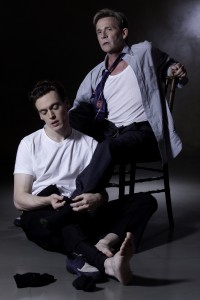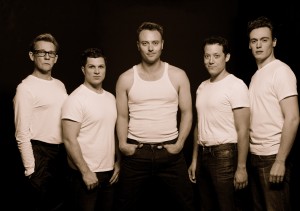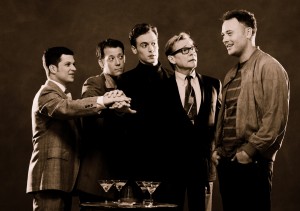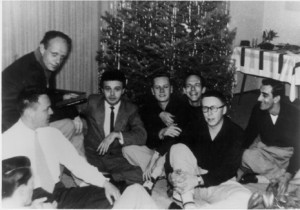NOT SO WILD ABOUT HARRY
Harry Hay and The Temperamentals—a play based on his activism during the infancy of gay liberation—have much in common: fascinating but peculiar; intriguing but repellent; well-intentioned but manipulative; imaginative but misguided.
Hay, who died in 2002, is best known as the match that lit the conflagration of the modern gay rights movement, but as with Larry Kramer (The Normal Heart), Hay could be so controlling, controversial, irascible, relentless, and impatient that he ended up alienating those whom he enrolled into the movement (although Hay was far more soft-spoken and sweet than Kramer). Even on the fringe of what he called “a sexual minority,” Hay began both the L.A. Gay Liberation Front and the Radical Faeries. You could recognize Harry from his trademark sun bonnet, scarf, pearls, wiry gray hair and a roaring Marxist passion for the brotherhood of man; when I met him in 1986, he was staunchly defending the inclusion of the controversial North American Man Boy Love Association (NAMBLA) in pride parades.
Playwright Jon Marans (Old Wicked Songs) has hit upon a most intriguing subject matter: the burgeoning gay movement in 1950s Los Angeles and the pioneers who risked their livelihoods for liberation. Some (read: mostly gay male theatergoers) may find Hay’s story so captivating that they will be willing to close their eyes to director Michael Matthews’ mismatched cast, conflicting stylistic choices, and maladroit staging. The success of two recent gay-themed productions, Daddy and Caught, only reinforce how a built-in audience keeps imperfect shows alive. (Don’t even get me started on the Jews who attend Jewtopia.) The Temperamentals is exactly the kind of theater that causes discomfiture for this reviewer: I am compelled to be overly kind because the story is so terrific and the actors are so notable, but regardless of how compelling the topic is, this outing is a misguided muddle.
Marans centers his story around the Mattachine Society, founded in 1950 by Hay (Dennis Christopher), along with his lover, the famous fashion designer Rudi Gernreich (Erich Bergen) and co-founders Chuck Rowland (Mark Shunock), Bob Hull (John Tartaglia), and Dale Jennings (Patrick Scott Lewis). This was the first continuing gay rights organization in the United States (gays referred to themselves as both “homophiles” and “temperamentals”). Also prominent in the story is the trial of Jennings, who was arrested for solicitation in 1952: instead of pleading guilty, Jennings acknowledged his homosexuality in court, but denied any unlawful activity. The notoriety of the case, and ensuing acquittal, brought new members and national prominence to Mattachine.
Marans both highlights and hinders his story by constructing numerous short scenes with everyone but Hay playing multiple roles. As such, the script feels as though it had been written for the screen and translated directly to the 2nd Stage Theatre, highlighting the discrepancy between an eminently theatrical Story Theatre-like presentation and a halting narrative flow. There is nothing wrong with this bullet point approach to a docudrama, but director Matthews needs to tighten the flow by utilizing starker segues. Lighting designer Cameron Zetty provides a feel of what this production needs to be: a taut, fast-paced, film noir, black-and-white, cinematic experience. Indeed, the most memorable moments in this West Coast premiere are the low-lit, back alley scenes, where men have to be constantly on guard lest they be found out. Marans’ script is chock-full of melodrama, cynicism and sexual situations; what is missing in this Blank Theatre production is the stylistic approach that makes film noir so damn swell.
The scene that opens the show offers the best of Marans’ work: Harry and Rudi are discussing the manifesto Harry has written while they slyly play footsie under the table. The scene highlights Harry’s vision, their love for each other, and the ever-present danger of being caught. The discussion of the word “cameo” and its double-meaning cleverly represents the dual aspects of “passing” in society. Harry was Rudi’s senior by ten years, but even this non-literal approach to a complex story cannot excuse the fact that Mr. Christopher, a wonderfully eccentric actor, is some  thirty years older than Mr. Bergen, a musical comedy actor. Rudi had been a dancer before becoming a costumer at MGM, so Mr. Bergen’s stylized approach suits him well, but their styles do not mesh. As such, their relationship as lovers feels inauthentic and lacks chemistry.
thirty years older than Mr. Bergen, a musical comedy actor. Rudi had been a dancer before becoming a costumer at MGM, so Mr. Bergen’s stylized approach suits him well, but their styles do not mesh. As such, their relationship as lovers feels inauthentic and lacks chemistry.
The copious number of scenes in the play calls for Kurt Boetcher’s (shall we say) figurative sets—a few chairs or a coat rack—but the relationships of the characters must be grounded in reality. Tony-nominated Mr. Tartaglia does some lovely work as the “sweet” Bob, but also shows his musical comedy roots. In fact, all of the actors succeed in the portrayal of their Mattachine characters, but the other parts they play are either broad—Tartaglia’s old man who is being recruited into Mattachine—or flat—Mr. Shunock as Vincent Minnelli, a brilliantly written part which has Minnelli convinced that nondisclosure is the surest way to a career in the movies. (As long as Marans “outs” dead celebrities, it’s odd that the “whatever-happened-to” wrap-up at the close of the show didn’t broach Hay’s romantic involvement with fellow communist Will Geer, a.k.a. “Grandpa” on The Waltons.)
Also quite odd is the Act II opening, where Harry is visited in his dreams by all of the women in his life. It’s a great idea to give us background on the development of an activist, but instead of being spooky and emotional, the other actors come off like Amish Stepford Wives, making the scene smack of misogyny. Equally disquieting is when we, the audience, become the members at a meeting; actors grab our hands and ask us to embrace. Suddenly, I feel a pair of hands rubbing my back from the audience member behind me. Breaking the fourth wall is one thing, but touching us completely takes the seriousness out of the moment (not to mention the “ick” factor involved)—theatrically, it’s bad form.
The play has no interest in letting us make up our own minds as to whether Harry Hay was a hero or a troublemaker, even though Harry’s trademark snappishness is evident. Marans no doubt delves into the dichotomy inherent in his characters, but the playwright seems more invested in beatifying these brave souls than in the investigation of their complicated natures in a complicated time. Still, the script is packed with potential: it is the inconsistent direction which diffuses one of the most mesmerizing stories of the twentieth century.
production photos by Greg Gorman
(photo of true-life Mattachine members at a 1951 Christmas party [bottom picture] by Jim Gruber)
The Temperamentals
Blank Theatre Company
2nd Stage Theatre, 6500 Santa Monica Blvd.
ends on May 22, 2011
for tickets, call 323.661.9827 or visit The Blank




